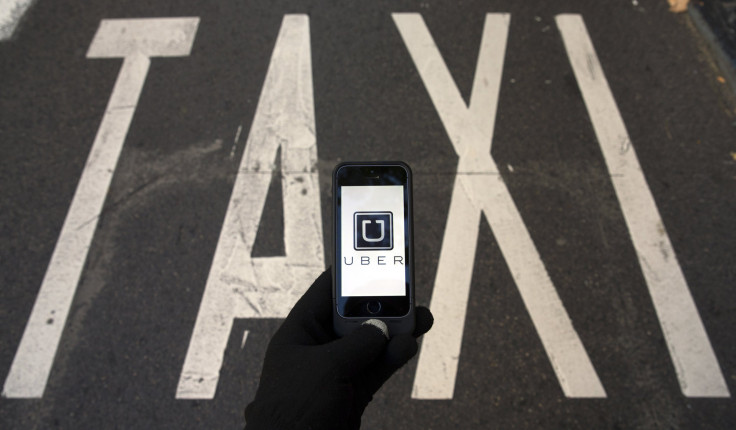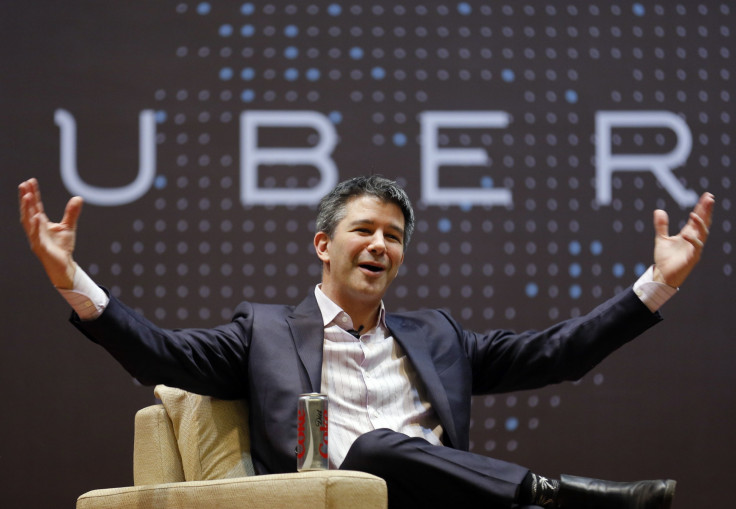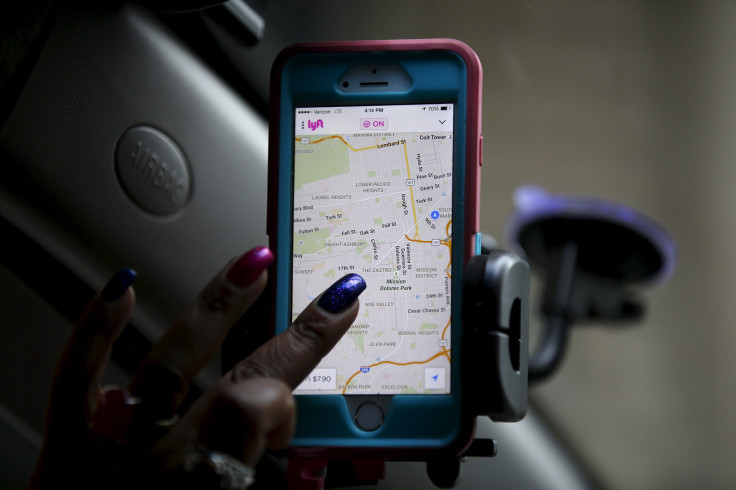Who Ends Up Paying For The Gig Economy? Uber And Airbnb Make Millions While States Lose Out

The “sharing economy” doesn't exactly share the wealth. President Donald Trump's administration has pledged to cut federal corporate and income tax rates substantially this year, but on the state and local level, sharing economy firms have been waging another tax battle — costing state and municipal governments, by some estimates, hundreds of millions across the U.S. Workers on platforms like Uber, Airbnb, Lyft, Fiverr and other so-called “gig-economy” companies, many of whom are doing the independent work out of financial necessity, may also be costing governments, as they often have to shoulder complex tax burdens on their own.
That issue stands to have long-running implications for state revenues, tax policy and independent — often young — workers. The sector is expected to grow to $335 billion by 2025 (from $14 billion in 2014), according to a December report from the Brookings Institution. And gig economy giants have been using their cash to influence lawmakers to keep their tax payments slim.
Read: What Millennials Should Know To Survive The Sharing Economy
As the gig economy has grown, the tax gap has widened. Because of inconsistencies in sales tax policies, state and local governments across the U.S. may be missing out on $300 million in annual tax revenues from transportation network companies like Uber and Lyft, according to a March study from the non-profit Institute on Taxation and Economic Policy. The Pew Charitable Trusts echoed that estimate in a mid-April report. Similarly, if Airbnb paid the same state and local taxes as did hotels for all of its U.S. listings, the room share app would’ve coughed up an additional $260 million last year, on top of the $177 million it was estimated to have collected and paid, an October study by the accommodations search engine AllTheRooms found.
One challenge for a rental service platform like Airbnb is that residential property taxes are far lower than commercial ones. As of 2015, the average commercial property tax rate in the nation’s largest cities stood at a level 68 percent higher than that of residential properties, according to a June study by the Lincoln Institute of Land Policy. New York and Boston topped the list with ratios of 4.22 and 4, respectively. The app has faced accusations of allowing its users to run illegal hotels, claims the company said were misleading.

Airbnb collects and remits statewide hotel taxes in 20 states and, among the states where it doesn’t collect and remit statewide occupancy taxes, 41 counties — a dozen of which are in New York and 20 of which are in California — along with the District of Columbia, according to its website.
But New York City, the ITEP report found, had missed out the most on Airbnb-related taxes, with more than $110 million in estimated foregone revenues in 2014. None of the Big Apple’s five counties were on Airbnb’s list of counties where hosts paid hotel taxes. In the second half of last year, the company spent about $237,000 at the New York State and City levels to lobbying firms involved in efforts related at least in part to “tax collection,” according to a state lobbying file.
Michael Mazerov, a senior fellow at the nonpartisan Center on Budget and Policy Priorities, said he was “shocked to see how big Airbnb has become,” and expected it to have “a huge impact on state and local revenues in the future.” The home-sharing company’s power also has an impact on government policy.
“These companies are very active in lobbying at the state level,” he said. “State legislatures have to decide whether they’re committed to a level playing field.”
In Hawaii, which ITEP found had lost out on $51 million in revenue, Airbnb spent nearly $64,000 on lobbying efforts related at least in part to “tax issues” between January 2016 and February of this year, the state’s lobbying documents show.
In July, Sens. Brian Schatz (D-HI), Dianne Feinstein (D-CA) and Elizabeth Warren (D-MA) signed a letter addressed to then Federal Trade Commission Chairwoman Edith Ramirez, imploring her department to further study Airbnb and its peers like HomeAway and FlipKey.
“We are also troubled by efforts of platform companies to negotiate agreements with state and local governments to collect and provide aggregate tax payments on rentals processed through their systems without providing more detailed information that would help officials to determine the legality of those rentals,” the three lawmakers wrote. “In other cases, online platforms appear to be complying with state and local tax laws inconsistently, collecting taxes in some jurisdictions and not others.”
Still, tax policy pertaining to Airbnb and other home-share companies has been far more straightforward than that of ride-share apps like Uber and Lyft, said Richard Auxier, a research associate at the Urban Institute’s Tax Policy Center.
“With Airbnb it was pretty simple — Airbnb is saying, ‘We have these third party people and we’re going to collect [all their taxes] and remit them,’” he said, adding that Uber has been a bit more difficult when it comes to tax policy. “Airbnb is trying to be very cooperative with governments… I don’t think Airbnb is nicer, but hotel laws are established. Taxis are complicated and confusing and vary state-to-state.”

Ohio, for example, was one of the six states that both were Uber and Lyft and applied sales taxes or gross receipts taxes on taxis services as of March, according to the ITEP report. In December 2015, Governor John Kasich signed House Bill 237, which regulates transportation network companies like Uber, and it became effective in late March. But along with mandating insurance requirements for the company’s drivers, HB 237 also “ preempt[s] any local ordinance, resolution, or other law adopted to license, register, tax, or otherwise regulate transportation network companies, transportation network company drivers, or transportation network company services.” Uber engaged in lobbying efforts between September and December of that year specifically involving the bill, according to state lobbying files.
Arizona and New Jersey have also taken steps to halt local regulation or taxation of ride-sharing companies over the past year, and both Uber and Lyft were actively lobbying those state governments during that period.
Georgia’s House Bill 225, which would impose a state sales tax on Uber and Lyft rides, was killed in the state’s House in early March, only to be resurrected the same day, passed and sent to the state Senate, where the bill failed to make it to the floor by the end of the month. An Uber spokeswoman told the Atlanta Journal-Constitution that HB 225 “would force Georgians to pay a high tax on each and every Uber ride” and “is out of step with states across the country and would hurt the millions in our state who depend on Uber’s affordability.” Uber spent tens of thousands on lobbying efforts in Georgia earlier this year, state lobbying files show.
After years of keeping Uber and Lyft out of upstate New York and Long Island, New York Governor Andrew Cuomo signed a budget in April allowing the apps to operate in the regions, albeit with a 4 percent sales tax. An earlier version of the governor’s transportation budget bill reportedly included a 5.5 percent levy, and competed with a New York Senate and Assembly proposals that also imposed sales taxes and regulatory requirements. Uber, whose corporate communications chief is married to Cuomo’s top staffer, was not registered as a lobbying client in 2017 as of May 1, but spent hundreds of thousands in lobbying efforts last year, in part at the state’s Assembly, Senate and governor’s office, as did Lyft, the state’s lobbying database showed.
Both companies also lobbied at the New York City level, where they’re treated as “black car” services subject to state and local taxes, but not the surcharge that funds a large part of the Metropolitan Transit Authority’s dwindling budget.

Around the time Georgia lost its bill implementing sales taxes on ride-share services, another measure, HB 61, which requires out-of-state entrepreneurs and e-commerce sellers to collect sales taxes, passed in the Georgia House in February. Bundled with an income tax cut bill, it stalled in the Senate at the end of March. E-commerce firms were just as lucky in New York. Cuomo’s budget failed to include a 4 percent Online Marketplace Tax that reportedly would’ve generated $204 million in revenue over the next couple of years. While Amazon.com and eBay weren’t registered as lobbying clients with either state this year, both companies launched a campaign in New York to stop the Online Marketplace Tax.
Auxier, of the Tax Policy Center, said state and local governments needed to do a better job of adapting to the evolving economy. He pointed out that, before relatively modern services like gym memberships became consumer commonalities, they weren’t taxed uniformly either.
“Airbnb and Uber are part of a larger phenomenon of, when the economy changes, they need to update their tax codes,” he said. “There’s no obstacle other than the political one.”
Mazerov, the Center for Budget Policy and Priorities senior fellow, placed more blame for the inconsistencies on the gig economy companies themselves.
“These industries really resist having state laws updated to fix their tax systems,” he said, drawing parallels to Amazon and the travel booking site Expedia, which bundles airfare, hotel and other vacation expenses. “That’s a slow process. It takes time for state and local governments to catch up.”
While states and localities have been working to implement policies requiring the companies to pay sales or property taxes, some of the difficulty stems from the tax compliance burden shouldered by gig economy workers themselves.
It’s been well-documented that sharing economy workers don’t get paid much. Uber, for example, agreed to pay the Federal Trade Commission $20 million in January for grossly inflating its reported drivers’ salaries. Fiverr, the freelance work marketplace, eliminated its $5 minimum selling price in November 2015 in favor of a system that would “make sellers nimble enough to compete” for projects. The platforms’ low wage offerings might be a reason their retention rates have fallen in recent years. But as independent contractors responsible for their own pay, gig economy workers are also generally responsible for figuring out how much they owe the government in taxes.
What makes a doer? Pursuing your vision whenever (and wherever) you choose. Start doing today. https://t.co/bNRKBkFsvg #InDoersWeTrust pic.twitter.com/qQ7RxKQxbZ
— Fiverr (@fiverr) February 21, 2017
For Airbnb, HomeAway and other room-share hosts, whether they’ll report their rental income on their 1040 Internal Revenue Service forms depends on how long they and their guests have stayed at the property. Entrepreneurs on Etsy, Amazon.com and similar sites may have to fill out a 1099-MISC or a 1099-K, depending on how many products they sold or how much they made.
Filers of those two forms, which also include Uber and Lyft drivers, must pay the IRS for their earnings as independent contractors every quarter — by April 15, June 15, Sept. 15 and Jan. 15 — rather than once per year, and face penalties if they don’t. And even if the ride-share app is the drivers’ main source of income, the company won’t withhold any of their federal income taxes, Social Security taxes or Medicare taxes, so they’ll have to pay a 15.3 percent self-employment tax to make up for it.
That’s on top of the marginal tax rate applied to their income as a contractor, freelancer or small business owner. (Donald Trump hopes to slash this tax, often known as a tax on “pass-through” income, but according to both Auxier and Mazerov, most sharing economy contract workers don’t make nearly enough to pay its highest rates, so it wouldn’t matter much to them.) Like freelance entrepreneurs, they can deduct expenses used for the sake of their business, such as car wear and tear, advertising, computer software and even snacks and drinks provided to Uber or Lyft riders, but the onus is on them to keep track of it all. They’ll also have to take care of their own retirement and health care — which could become difficult in the event that the Affordable Care Act is repealed.
Fiverr’s site states that “it is the sole responsibility for sellers to verify their personal tax obligation, report, and pay taxes according to the laws of the state and/or country of residence, as applicable and required by local law and regulations.” Etsy and Amazon require their third-party sellers to collect sales taxes, but only when the sale is made in the same state where the seller’s business has a physical presence, known in tax jargon as a “nexus.” Amazon, which just became liable for sales taxes four and a half years ago, left many of its third-party entrepreneurs liable for nearly $2 billion in sales taxes last year by creating such “nexuses” at an increasing number of warehouse locations throughout the country.
Gene Zaino, the president and CEO of MBO Partners, which provides consulting and assistance for independent and contract workers, said the platforms could do a better job of educating their workers on their tax obligations; for non-specialized gig work like ride-share services and the quick, menial jobs provided by TaskRabbit, the platforms should offer their contractors something close to full employment, like a license or certificate, while leaving specialty workers and freelancers on their own.
“There’s not a one-size-fits-all solution,” Zaino said. Still, he added that lower-income gig workers who can’t afford financial advisers or tax help could certainly use a hand from the companies for which they work. “Just like it’s simple to hit a button and get a car somewhere, you should be able to hit a button and make sure you’re getting your taxes right.”
© Copyright IBTimes 2024. All rights reserved.





















